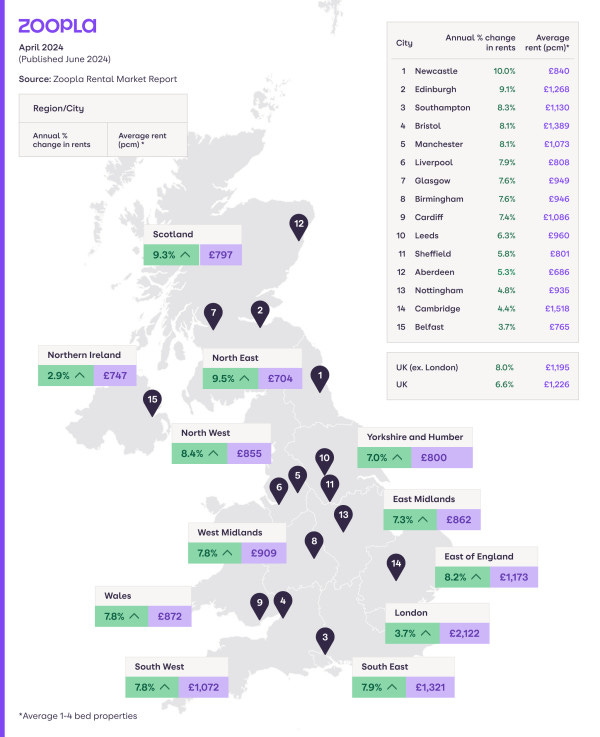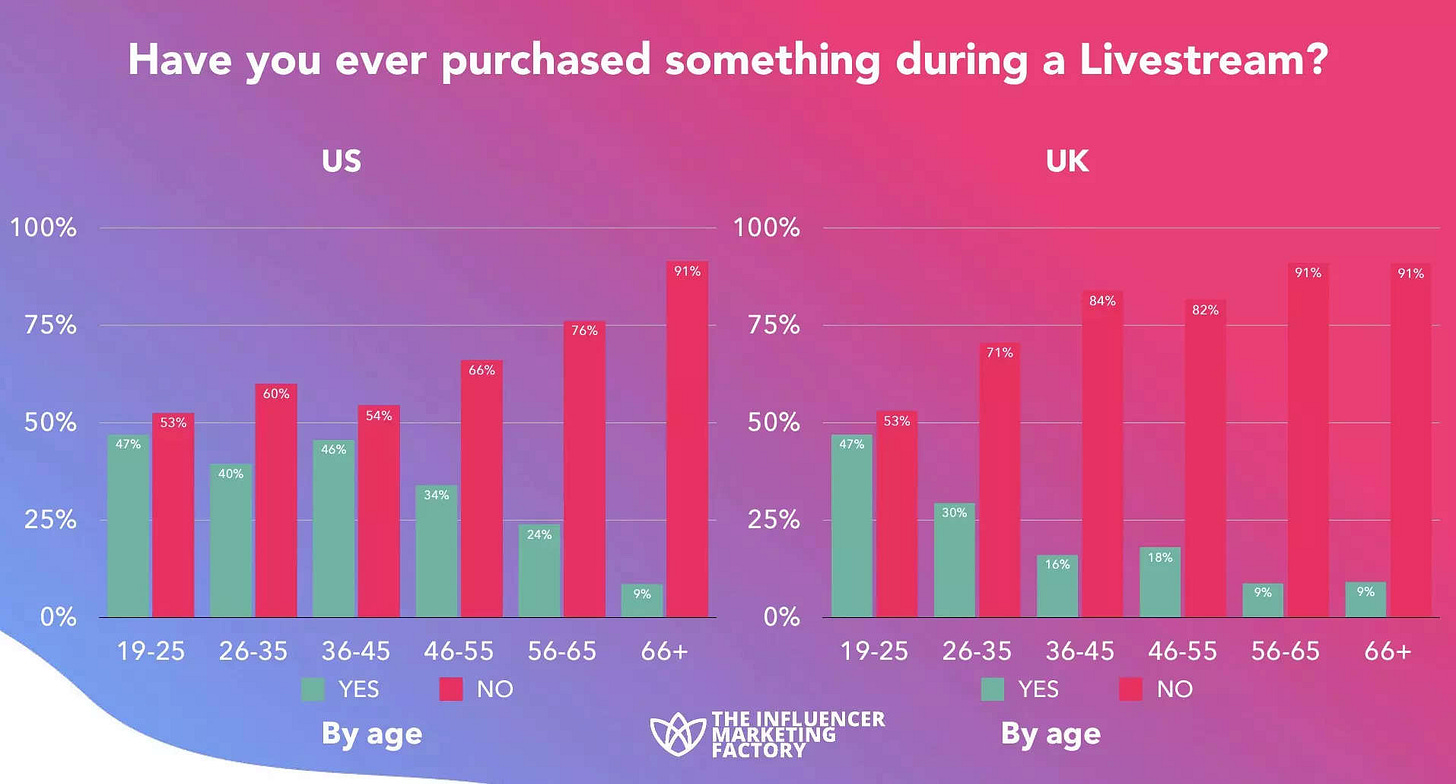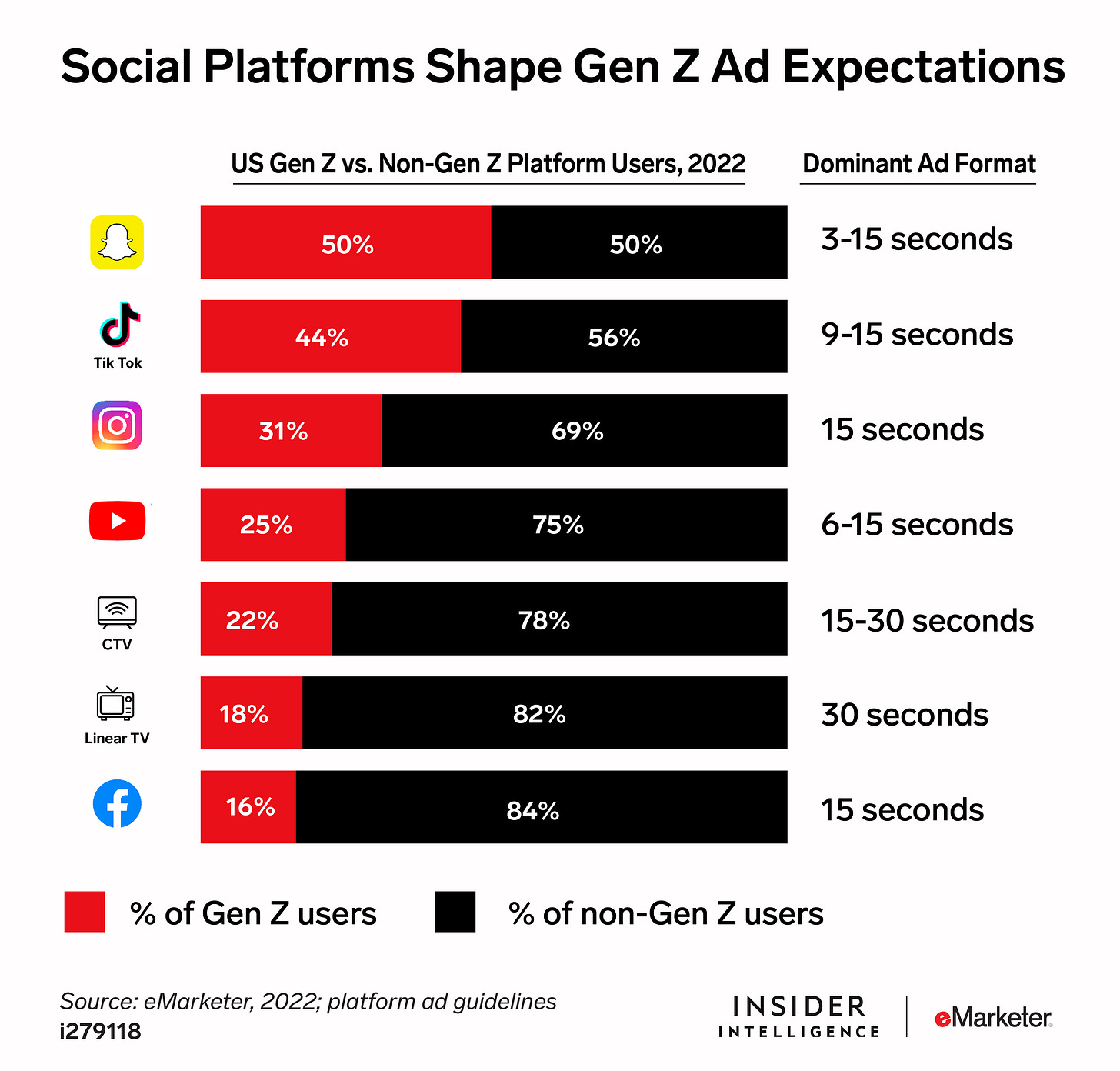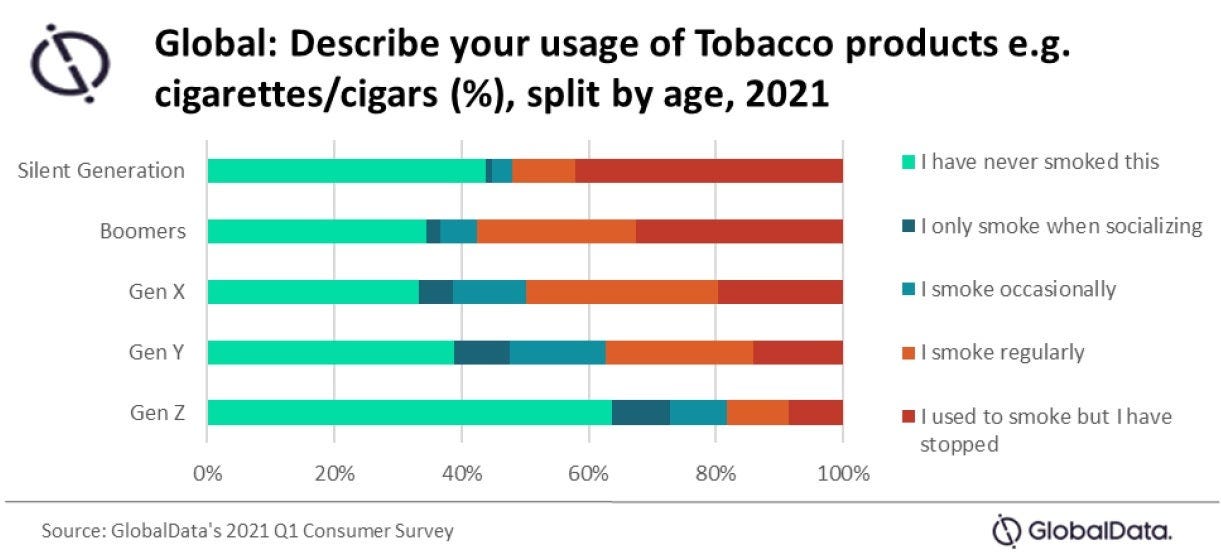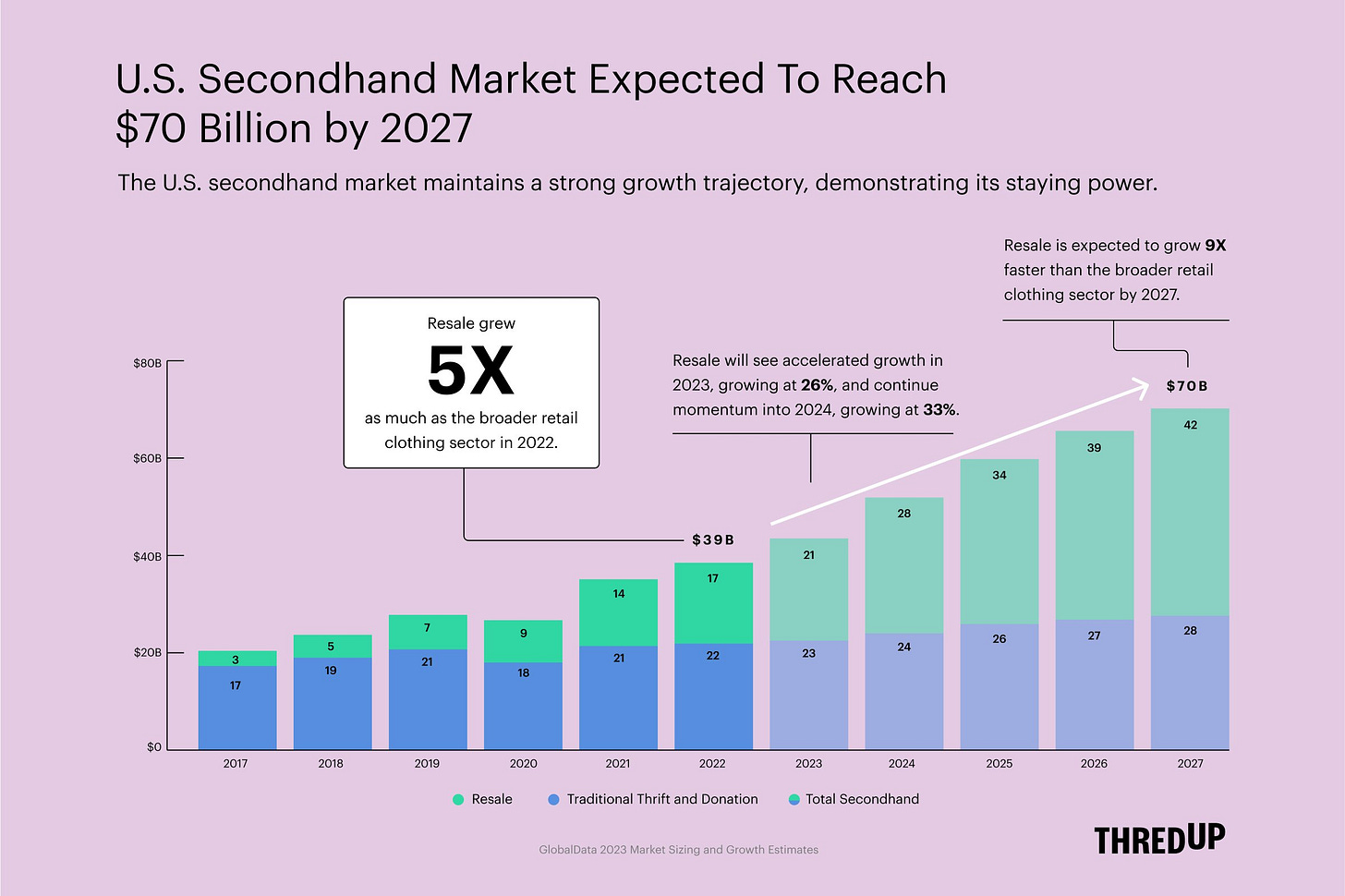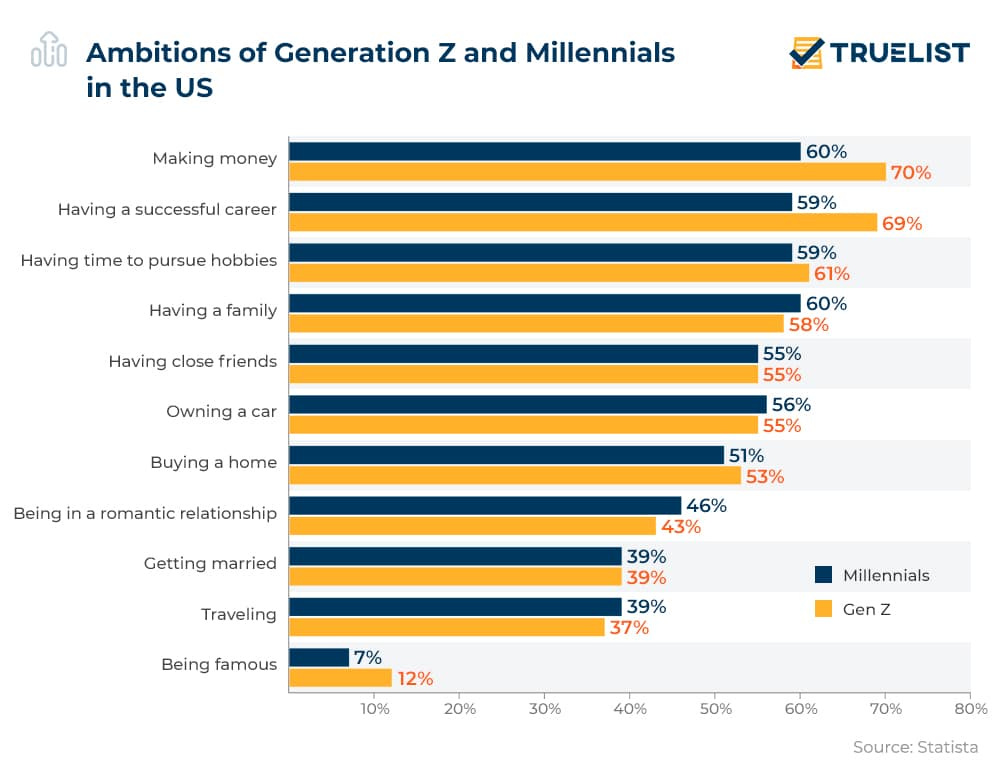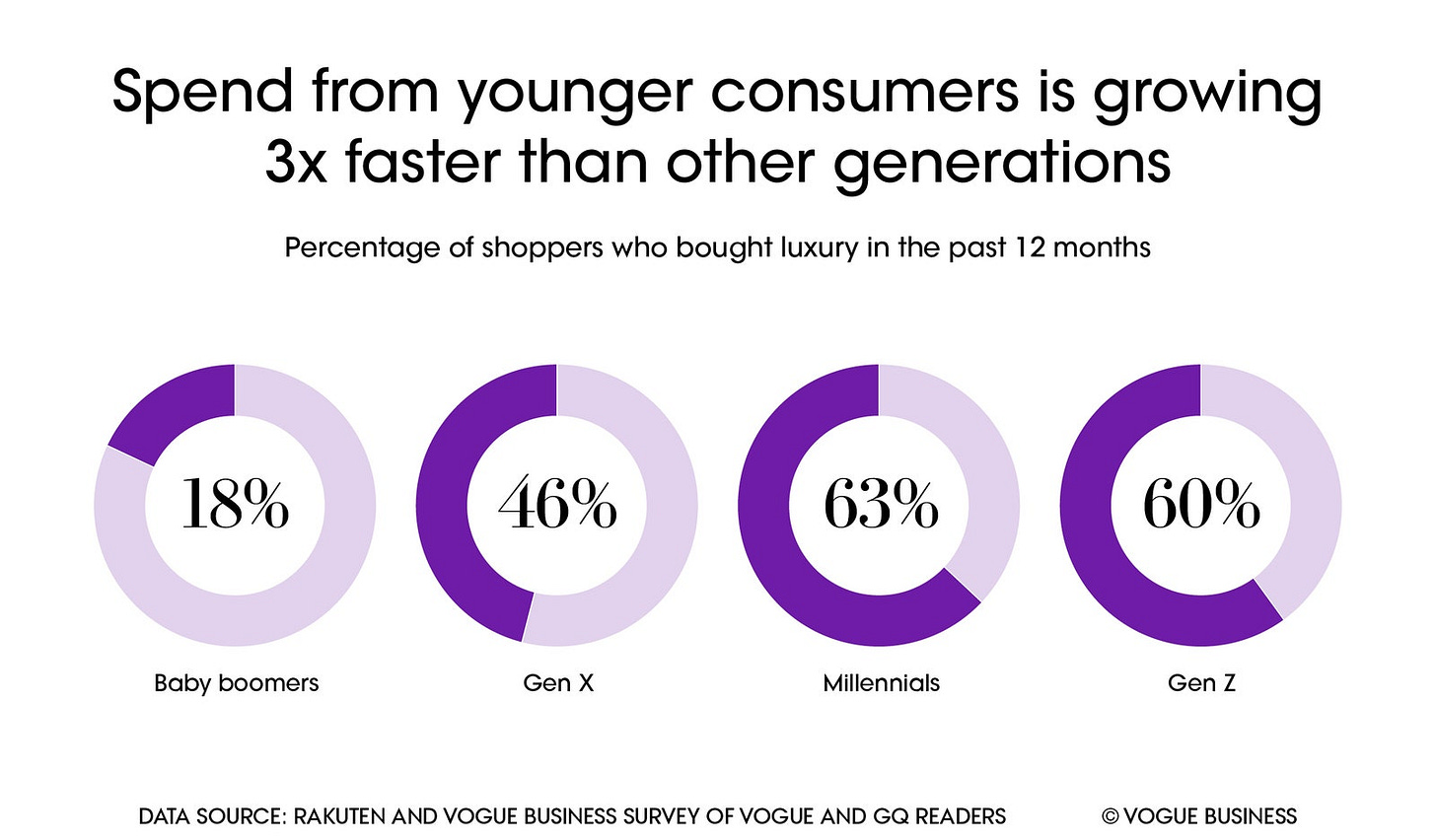Generation Z: The Game Changers
The Most Loved Brands, Consumer Habits, Relationships, Sustainability, and more.
Hey Readers!
Welcome to New Economies, where we share and discover the latest technology trends shaping our world. In this week’s edition, we explore the consumer behaviours and trends which Gen Zs are setting.
As a 26-year-old, my friends and I frequently discuss a variety of topics, including our health, how we spend our time and money, the cost of living, the possibility of homeownership, and our career prospects. These conversations have inspired me to share a series of insights, complete with graphs and data points, on how Generation Z is influencing these areas and the potential impact it may have on future generations.
Disclaimer: Most of the graphs included were published from 2022 to the present.
What is Generation Z?
Generation Z, often referred to as Gen Z, includes individuals born from the late 1990s through to the early 2010s who happen to make up 25% of the global population. This generation follows Millennials and precedes Generation Alpha.
How Generation Z is shaping future generations
Gen Zs make up 25% of the global population. This gives them enormous advantage to have a voice across: Politics, sustainability. environmental causes and fundamentally, creating and changing consumer behaviours, which we will be exploring more of later on.
Top concerns for Gen Zs
Cost of living is the most pressing concern for almost 1/3 of Gen Zs, followed by climate change.
If we take the U.K. for example, cost of living and rental prices have increased by more than 10% in recent years.
As a result of these high-cost living locations, we have seen a rising trend of digital nomads who can work anywhere in the world. To give you an example, in 2021, the number of digital nomads increased by 42% compared to 2020, with 15.5 million Americans identifying as digital nomads. In the future, I expect to see a very large number of Gen Zs and Generation Alpha (those born from 2010 onwards) becoming digital nomads once they enter the workforce.
Millennials, Baby Boomers, Gen X, and Gen Z share their favourite brands
Surprisingly, those ‘old school’ brands that the ‘Boomers’ love such as UPS and Home Depot, are amongst the favourites. You’ll see that as we enter the Gen X group, these consumers are most likely more technologically advanced with the likes of Google, Amazon, Netflix, and YouTube included as favourites.
Shopping
71% stay loyal to brands they trust, even if they make a mistake
Trust is important to customers in all generations, but it is paramount to Gen Z. 61% of them will pay more for brands they trust, and 71% will forgive and even recommend brands they trust who have made mistakes.
Gen Zs’ favourite fashion brands by unprompted awareness
When exploring which fashion brands Gen Zs most favour, Nike tops the list for sportswear, Gucci for luxury, H&M for fast fashion, Levis as a mid-tier fashion brand and Shein for ultra-fast fashion.
Live Shopping
Have you ever purchased something during a livestream?
Live streaming is enormously popular in Asia, with platforms such as Taobao Live and JD Live leading the industry in China. Picture a creator showcasing clothing items in a video on TikTok—viewers can purchase these items with just one click. This trend raises the question: How might our shopping habits change in the future?
Well, 75% of Gen Zs follow creators and influencers online with a significant majority often discovering new products through these platforms, placing influencers ahead of traditional celebrities in terms of impact and trust.
The Attention Economy
Gen Z loses active attention for ads after just 1.3 seconds—less time than any other age group, according to a global study by Yahoo and OMD Worldwide.
Let’s turn to: Food & Diets
Plant-based diets
While 2 in 10 Baby Boomers in the U.S. consume plant-based meat at least once a month, more than half of U.S. Gen Z population consume plant-based meat at least once a month.
While there are a myriad of reasons for consuming plant-based meats, amongst all consumers the top 3 reasons are:
1. They feel that plant-based options are healthier than animal-based options.
2. They feel generally better about what they’re eating.
3. They feel that plant-based options are better for the environment.
Environmental Mindset
When it comes to values surrounding food, Gen Z is significantly less likely than older generations to believe that meat – whether celebratory steak or Thanksgiving turkey – is a central part of American identity or American culture. In addition, this generation is vastly more aware than the general population that animal agriculture damages the environment. Gen Z values environmental sustainability much more than previous generations, and are willing to spend more on sustainable food.
Health
Gen Zs are drinking less
A growing number of young Brits are giving up alcohol, driven by a focus on wellbeing and rising costs. Instead, they are turning to healthier alternatives such as zero-percent alcoholic beverages, flavoured waters and natural organic drinks.
Global consumers are also smoking much less
Generational smoking trends amid Covid-19 show Gen Y to be the most active smokers, while Gen Z abstain.
This trend may possibly affect public companies such as American Tobacco in the future.
Mobile First
Gen Zs are mobile first from shopping, browsing social media, to WhatsApp. 55% of Gen Zs use their smartphones 5 hours or more a day and 26% use their mobiles 10 or more hours a day. 31% also feel uncomfortable if they are without their phones for 30 minutes or less.
Sustainability
The secondhand market is poised to explode. Resale grew 5x as much as the broader retail clothing sector in 2022 and Gen Zs are happy to pay for it. According to Kadence, 73% of Gen Zers are willing to pay more for sustainable products.
Platforms such as Depop, Etsy and eBay are some of the platform leaders in this category.
Future of Work
Over half of Gen Zs say they want to start their own company
54% of Gen Zs aspire to become entrepreneurs. This goes in line with Generation Z education statistics that highlight the hesitation young people have towards higher education. Over 30% of Gen Zs said they considered taking a gap year after high school. A significantly larger proportion, 89%, have considered a different path than the traditional four-year degree.
70% of Generation Z thinks that making money is important while only 12% believe that being famous is also essential
According to Statista’s Generation Z facts, 70% of post-millennials see making money as a priority for their future, compared to 60% of millennials who prioritise the same thing. On the other hand, the same study reveals that 12% of the younger generation would want to be famous, as compared to 7% of millennials that feel that way.
Education
75% of Gen Zs don’t consider college the only path to a strong education
Having witnessed a number of friends taking out student loans, a surprisingly high number of Generation Z members don’t see college as a prerequisite to success in life. Many are choosing to go into the workforce right after school. 89% of them also say that they aren’t keen on taking on debt to cover the costs of higher education. In some countries such as the U.K, if you take out a student loan at $80,000, upon graduation and landing your first job, interest rates on the repayment can reach 7-9% annually.
Buying Power: American Gen Zs hold $44 billion in buying power
68% of Gen Zs read 3 or more reviews before buying something for the first time with their own money
Generation Z statistics show that if marketers want to sell their brand to this cohort, it’s even more critical to build a body of consistently positive online reviews than it would be when targeting other cohorts. Another way to impress this generation is to use top-ranked influencer marketing platforms to find the right individuals and build an engaging social media presence. 46% of Gen Z currently follow more than 10 influencers on social media, while 73% follow at least one brand and 52% follow three or more.
Luxury spending
Millennials outspend younger Gen Z counterparts by 63% on wedding rings
Millennials outspend Gen Zs by 63% when it comes to buying an engagement ring. The average price paid for a ring by Millennials is $6,700, compared to $4,100 spent by their younger counterparts, according to a newly released survey by The Knot.
Gen Zs value sustainability and spend more for it
Both generations prioritise sustainability. Two-thirds say they are likely to buy from brands committed to sustainability, and 69% believe brands need to be responsible for decreasing their carbon footprint. Further, they use their wallets to prove their values, as 54% of Gen Z and 50% of Millennials are willing to pay 10% more for eco-friendly products.
Upgrade to read further insights:
An additional 120+ graphs across: Fertility, relationships, The Asset-Less Economy, social media consumption, the impact of AI, travel, personality traits and more!
$1M in discounts at the likes of Notion, Hubspot, Digital Ocean and other leading platforms
Access to our data room: Hundreds of new startups added each week
Save hundreds of hours for just $40 a year. You also receive a 7 day free trial!
❤️ If you enjoyed this piece! See you next time.




